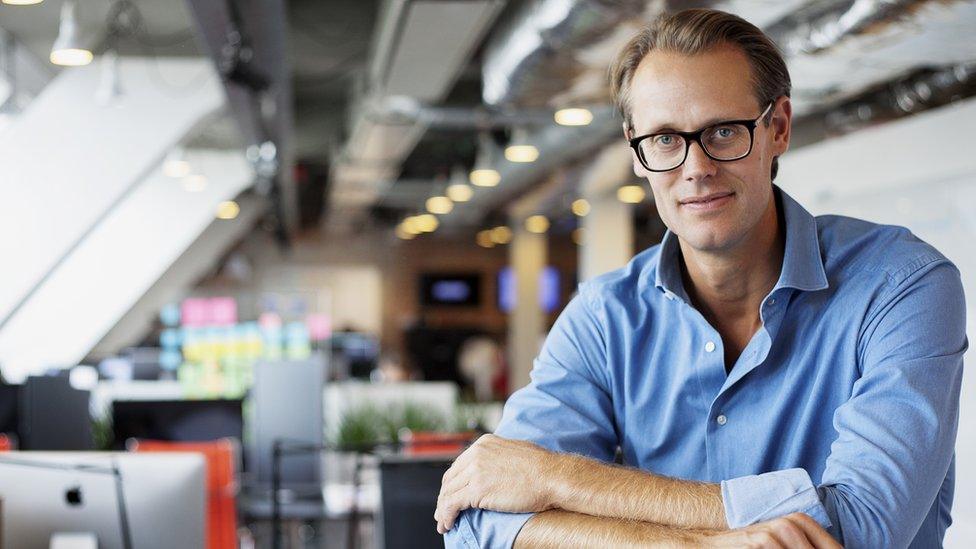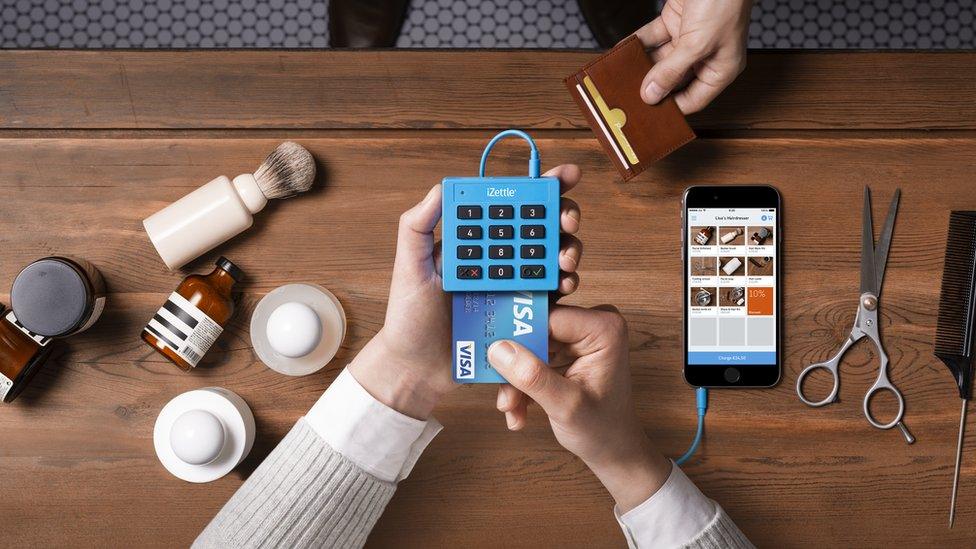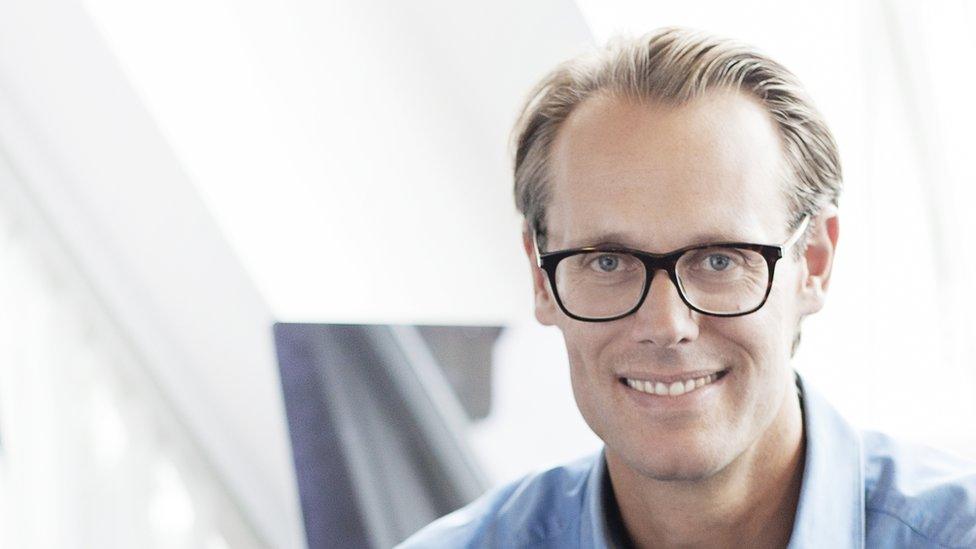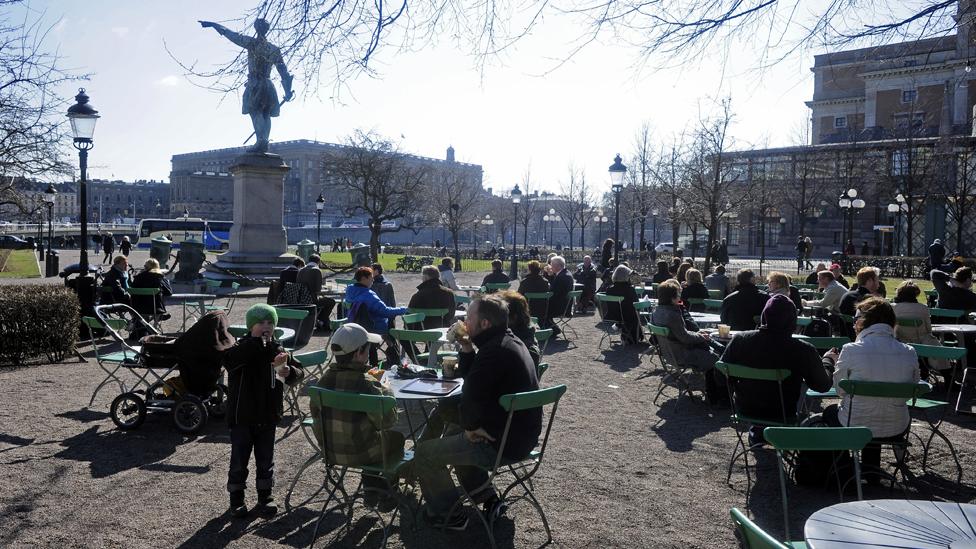The Swede leading the way to a cashless society
- Published

Serial entrepreneur Jacob de Geer was about to "get a real job" when he stumbled upon a gap in the market, and launched one of the most successful start-ups in his country's history.
"We'd just had our second child. I was at a place in life where I really felt like I could use some stability," says the 40-year-old Swede.
"You know, a nice fixed salary that would actually hit my account on a monthly basis, possibly a company car, and a pension would have been nice as well; some of the things that you never get if you run your own business."
This was back in 2010, and as the global financial crisis continued to engulf Sweden, Mr de Geer said it definitely didn't feel like the right time to launch a new business.
But it was in January of that year that his wife, a sunglasses importer, returned from a trade fair and complained that she'd lost out on business because she couldn't accept debit cards from her customers.
Mr de Geer says this was because, at the time, most sole traders and small firms couldn't afford the expensive mobile card processors available from banks.
"My wife said 'someone must have solved this for small businesses, so that it makes sense for us'," he remembers.
Except they hadn't, at least not in Europe. And Mr de Geer - who had previously set up and sold a number of media companies - was determined to do something about it.

Mr de Geer says Sweden was quick to warm to the iZettle system
The Stockholmer started to research the market, and discovered that there were some 20 million small businesses in Europe in need of an affordable solution.
Four months later, he joined forces with his friend Magnus Nilsson and founded iZettle.
The company's technology works by turning smartphones and tablets into credit and debit card processors, by linking them to a £35 card reader that connects via the headphone socket.
A customer simply puts his or her card into the trader's iZettle reader, enters their pin number, and the payment is made.
The product was quickly successful in Sweden, and is now used by thousands of traders in 12 countries, mostly across Europe, but also Mexico and Brazil.
Thee firm says it is continuing to grow so fast that 1,000 new customers sign up every day. And it has secured €140m ($157m; £120m) of investment.
'Right timing'
Mr de Geer attributes part of the firm's early success in Sweden to a "tech savvy" population that loves to embrace new trends, gadgets and fashions.
"It's one of the reasons why Sweden is a common test bed for many international companies to test their products," he says.

Mr de Geer says that firms have to be very careful when they are changing part of their product or service
"They know if it flies here it will probably fly in most other places as well."
Thanks in no small part to iZettle, Sweden is leading the race to become the world's first cashless society. In 2015 80% of all retail payments in the country were made by card, compared with around 52% in the UK and 45% in the US.
In addition to the sale of the card readers, iZettle makes its money by charging users a monthly fee, which is a percentage of the overall payments received. This ranges from 2.75% down to 1%, depending on how much money the trader makes.
iZettle says this remains significantly less than mainstream banks charge for their mobile card processing services.
Prof Niklas Arvidsson, from Sweden's Royal Institute of Technology, says there are a number of reasons for iZettle's success, including being at the right place at the right time.
"The timing was right. There was a need from a lot of merchants that wanted a solution like iZettle, that allowed them to take payments in situations where they had not been able to use card readers before."
Speaking about Mr de Geer, Prof Arvidsson adds: "He seems like a focused entrepreneur, and someone who has the ability to have an idea and bring it home."
Taking care
As iZettle faces increasing competition from rivals, Mr de Geer is candid about the firm's challenges as he seeks to expand the business.
"We try things, we test them, we validate with data, and 99 out of 100 times we conclude that the change that we made to a service or a product was for the worse," he admits.

The Swedish public have led the way in moving away from paying with cash
"Something that you thought would be so easy to do, or straightforward, it always turns out to be some sort of rollercoaster ride from hell, really. Most of the time it's fun, but there are days when you are really not that keen to go to work."
However the Swede says he can't imagine a life that didn't involve being 100% committed to his business.
"If you set up and start your own company, it's effectively a baby that you need to take care of," he says.
"Unless you take care of it and let it grow, nobody else is going to do it for you."
The son of a former banker, who later set up a fund management firm, before investing his savings in a farm, Mr de Geer accepts that his hardwired entrepreneurial spirit may, in part, be down to his father's influence.
But it was only after completing a masters at Stockholm School of Economics, that he says he became convinced that he wasn't cut out for a traditional graduate career.
Mr de Geer adds that working for a digital marketing agency owned by Spotify co-founder Martin Lorentzon in his 20s added further inspiration to become his own boss.
He says: "The joy of doing something on your own, and creating something, and being able to a certain extent to control how you work... I think that was really an eye-opener for me. I thought that was amazing."
But iZettle's chef executive says that these days most of his drive comes from being around his three children ("they see endless possibilities, no problems") and iZettle's growing global customer base of small business owners.
"There are so many struggling guys and girls out there who are working hard to make a living," he says.
"They make their coffee, and they make their sandwiches, and they sell them to people walking by their cafe, and then they go back in again the next morning. They are the true heroes."